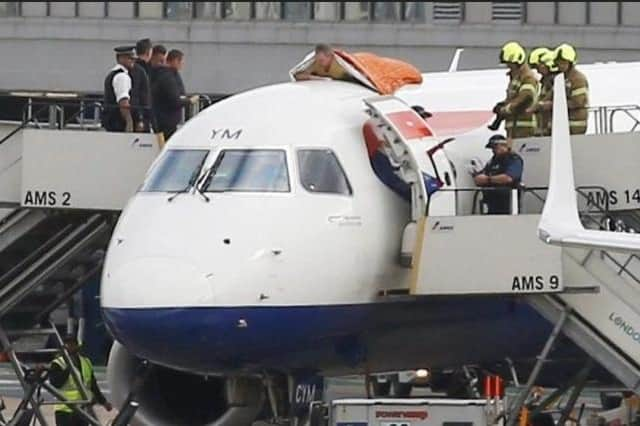Blind Ulster athlete glued himself to a plane for sake of his children’s future


James is serving a 12 month sentence at Wandsworth Prison.
Judgement on both sentence and conviction will be delivered at a future date.
The panel of three judges sitting at the Royal Courts of Justice today was led by the Lord Chief Justice (the most senior judge in England and Wales).


Advertisement
Hide AdAdvertisement
Hide AdJames’ action was part of Extinction Rebellion’s occupation of London City airport on 10th October 2019 in protest against aviation expansion and the climate impacts of flying.
During his trial at Southwark Crown before Judge Gregory Perrins earlier this year, James Brown told the jury he feared for his children’s future and that civil disobedience was the only option left to him.
He told the court: “I want all the children of our world to grow up free from the impact of starvation, war and the other horrendous impacts of the climate crisis.
“That’s not going to happen. Their future is terrifying.”
During his career, James competed in several athletic categories and won two gold medals for Great Britain at the 1984 New York Paralympics. He denied he had caused a public nuisance.
Advertisement
Hide AdAdvertisement
Hide AdExtinction Rebellion’s occupation of London City Airport was designed to highlight the climate impact of air travel.
The most energy-intensive activity an individual can undertake, no other human activity consumes as much energy in such a short time.
Mile for mile, flying is the most climate-damaging way to travel.
Extinction Rebellion has a number of cases going through the Crown Courts.
Advertisement
Hide AdAdvertisement
Hide AdJames’s was the fourth jury trial, and followed the acquittal in April 2021 of six people for criminal damage to Shell’s London HQ, despite all but one having no defence in law.
In July this year, the UK government published its Jet Zero strategy to achieve net zero in the aviation industry by 2050.
Air travel is an elite activity.
Only a tiny percentage of the global population can afford to fly and they have a disproportionate carbon footprint.
Taking a long-haul flight generates more carbon emissions than the average person in dozens of countries around the world produces in a whole year.
Advertisement
Hide AdAdvertisement
Hide AdThe government has repeatedly been advised by its own Climate Change Committee to limit the growth of aviation in the next 10 years, starting with a halt to airport expansion.
The government’s suggestion, in its Transport Decarbonisation Strategy, that the public can continue to fly since aviation will be carbon neutral by mid-century have been widely ridiculed.
The government has recently proposed a reduction in Air Passenger Duty Tax whilst the industry is already estimated to be subsidised by £7bn per year.
The news comes as the PCSC Bill, which has been widely criticised for seeking to limit the right to protests, returns to the House of Lords for amendments.
Zoe Blackler, Extinction Rebellion media officer
Advertisement
Hide AdAdvertisement
Hide AdFor more letters, opinion pieces, and News Letter editorials, go to this link:
——— ———
A message from the Editor:
Thank you for reading this story on our website. While I have your attention, I also have an important request to make of you.
With the coronavirus lockdowns having had a major impact on many of our advertisers — and consequently the revenue we receive — we are more reliant than ever on you taking out a digital subscription.
Subscribe to newsletter.co.uk and enjoy unlimited access to the best Northern Ireland and UK news and information online and on our app. With a digital subscription, you can read more than 5 articles, see fewer ads, enjoy faster load times, and get access to exclusive newsletters and content.
Visit
now to sign up.
Advertisement
Hide AdAdvertisement
Hide AdOur journalism costs money and we rely on advertising, print and digital revenues to help to support them. By supporting us, we are able to support you in providing trusted, fact-checked content for this website.
Ben Lowry, Editor